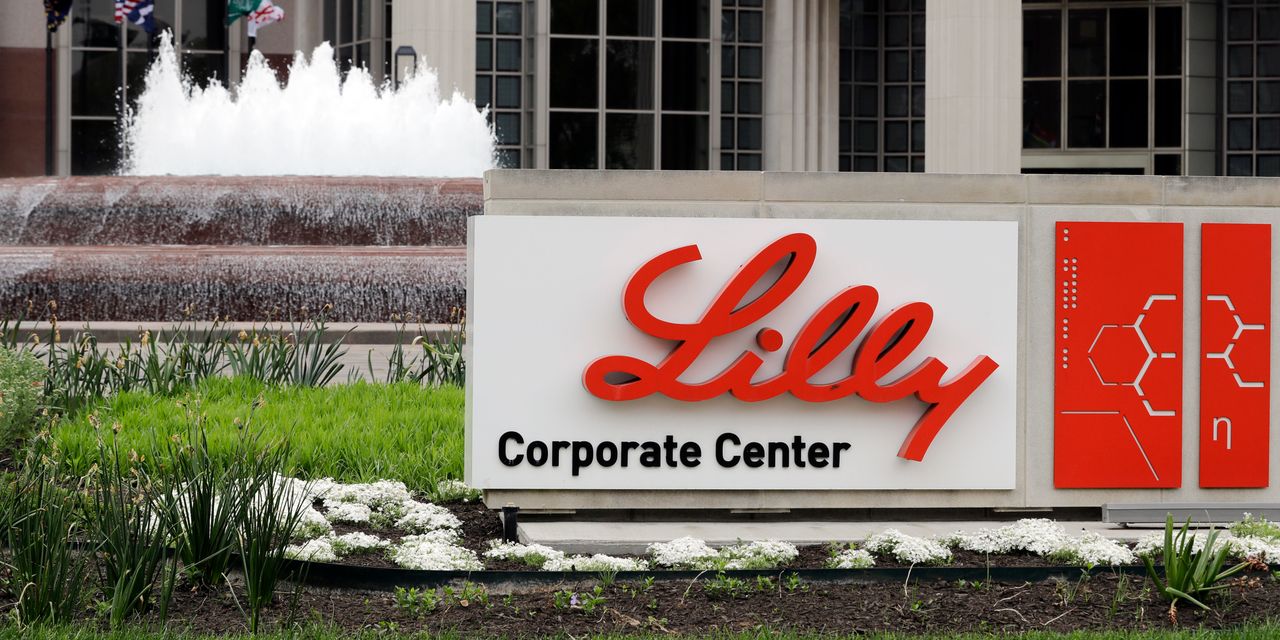Eli Lilly & Co.’s stock jumped 6% Wednesday, after the company
LLY,
announced positive results from a late-stage trial of its Alzheimer’s disease treatment donanemab.
The Phase 3 trial showed that donanemab “significantly slowed cognitive and functional decline” in patients with early symptomatic Alzheimer’s disease, and met its primary and all secondary endpoints, or goals.
Nearly half, or 47% of participants, had no clinical progression at one year, compared to 29% on placebo. Donanemab slowed clinical decline by 35% compared to placebo and resulted in 40% less decline in the ability to perform activities of daily living, including managing finances, driving, engaging in hobbies and conversing about current events, the company said.
However, the monthly antibody infusion is not without risk. Donanemab can cause temporary brain swelling and bleeding. Three participants died of those side effects, the company said.
“We are encouraged by the potential clinical benefits that donanemab may provide, although, like many effective treatments for debilitating and fatal diseases, there are associated risks that may be serious and life-threatening,” said Dr. Mark Mintun, group vice president Neuroscience Research & Development at Lilly, and president of Avid Radiopharmaceuticals.
“We note that these results suggest that people in the early pathological stage of disease could be the most responsive to therapeutics targeting amyloid.”
Still, Dr. Daniel Skovronsky, Lilly’s chief scientific and medical officer, and president of Lilly Research Laboratories, said the trial is the first of any medicine for Alzheimer’s to deliver 35% slowing of clinical and functional decline.
Lilly is now planning to proceed with global regulatory submissions as quickly as possible and expects to make a submission to the U.S. Food and Drug Administration this quarter.
The FDA has already granted an accelerated approval to Eisai and Biogen Inc.’s
BIIB,
Alzheimer’s treatment called Leqembi for patients with mild cognitive impairment or mild dementia.
Mizuho analysts said the safety issue may be an underappreciated headwind and will certainly be debated. For now, it looks as if Leqembi has a safer profile, which will be important for doctors prescribing for an elderly population.
Leqembi did not cause any patients to die from amyloid-related imaging abnormalities, or ARIA, which is the clinical term for the brain swelling and bleeding.
“In an elderly population, where people care so deeply for their parent and grandparents, in a new drug class, safety can become a big underline in the conversation when reality is met with having to make a decision; pick your drug,” wrote analyst Salim Syed in a note to clients.
Overall, however, the news is good for the beta-amyloid class as a whole, and should help commercial/reimbursement overall, he wrote. Mizuho has a buy rating on Biogen.
The news comes after the FDA in January declined to grant the Lilly drug a speedier approval process using less rigorous clinical data. The FDA told the drugmaker at the time that it wanted to see clinical data from at least 100 patients with early symptomatic Alzheimer’s disease who had taken donanemab for a year.
For more, see: Why the FDA didn’t grant an approval to Lilly’s Alzheimer’s drug
Lilly said that “many patients” included in the Phase 2 clinical trial stopped treatment as early as six months due to the “speed of plaque reduction.”
On Wednesday, it said participants in the Phase 3 trial dubbed Trailblazer-ALZ 2 also completed their course of donanemab once they reached a prespecified level of amyloid plaque clearance.
Donanemab produced “significant reductions” in brain amyloid plaque levels as early as six months after starting treatment based on brain scans, the company said.
“Amyloid plaque is a defining pathophysiological feature of Alzheimer’s disease,” said Dr. Eric Reiman, CEO of Banner Research, one of the research sites for the trial. “This study’s topline results provide compelling support for the relationship between amyloid plaque removal and a clinical benefit in people with this disease.”
See also: Biogen wins accelerated FDA approval for treatment for rare form of ALS
The trial involved 1,736 participants aged 60 to 85 years with early symptomatic Alzheimer’s disease.
Lilly is continuing with multiple clinical trials of the treatment, including Trailblazer-ALZ 3, which is focused on preventing symptomatic Alzheimer’s disease in participants with preclinical AD.
It’s also currently enrolling patients in a trial in China, and preparing a trial focused on expanding its understanding of ARIA through novel MRI sequences, blood-based biomarkers and different dosing regimens of donanemab.
Lilly’s stock has gained 10% in the year to date, while Biogen has gained 13% and the S&P 500
SPX,
has gained 7%.
Read now: Eli Lilly’s next-generation obesity drug helped patients lose up to 34 pounds in clinical trial
Read the full article here













